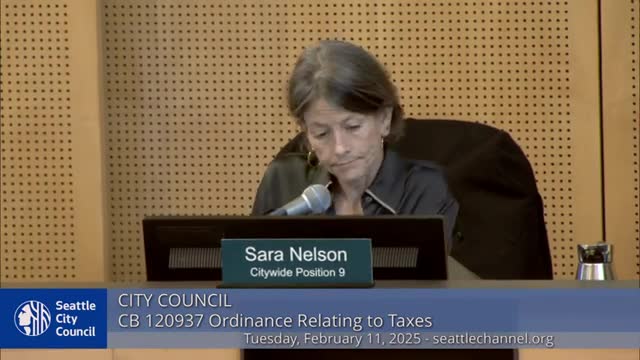Seattle City Council adopts amended crowd-management policy limiting some "less-lethal" tools after hours of debate
Get AI-powered insights, summaries, and transcripts
Subscribe
Summary
The City Council on Feb. 11 passed Council Bill 120916 to set new rules for crowd management and restrict some less-lethal tools, including new deployment limits on blast balls, after extensive public comment and multiple amendments. The bill passed 6-3.
SEATTLE — The Seattle City Council on Feb. 11 passed an amended crowd-management ordinance (council bill 120916) that sets new limits on the Seattle Police Department’s use of certain “less-lethal” tools, including deployment standards for blast balls and a role for accountability bodies and the executive in authorizations.
The vote was 6 in favor and 3 opposed. Council members Saka, Solomon, Strauss, Kettle and Council President Sarah Nelson voted yes; Council member Hollingsworth voted no; the final tally recorded 6–3 in favor. The ordinance was adopted as amended and the chair signed it.
The measure updates Seattle Municipal Code to align with state law on chemical agents, clarifies the roles of oversight bodies and SPD command, and adds new deployment guidelines for blast balls. It was the culmination of a months-long process tied to the city’s consent-decree work and followed a lengthy public comment period in which dozens of residents and activists urged the council to keep a ban on blast balls and other less-lethal munitions.
Council member Kettle, chair of the Public Safety Committee and sponsor at the full council, framed the bill as balancing public-safety and civil-rights protections. “This bill ... is key, to protect the rights to free speech and assembly,” Kettle said during the committee report, adding that training and oversight are central to the city’s approach.
Central staff and members debated and voted on a series of competing amendments before taking the final vote. Key changes made on the council floor included: - Requiring that the chief of police be the departmental official who authorizes blast-ball use after a mayoral proclamation (Amendment B, adopted). The council adopted language that places authorization with the chief of police following the required mayoral proclamation. - Deployment technique limits for blast balls (Amendment D, adopted). The council adopted a requirement that, for crowd movement or dispersal, blast balls “shall not be deployed directly into a crowd,” shall be deployed underhand using a bowling-style motion and “away from people”; overhand deployment remained allowable only for specific individual-interdiction, life-safety uses. - A recital from the Community Police Commission noting past injuries linked to blast-ball use (Amendment E, adopted).
Not all proposals advanced. An amendment that would have made the mayor the sole authorizer of blast-ball use (Amendment C) failed, as did proposed private-rights-of-action language and several other measures that would have expanded council review of SPD policy changes.
Throughout the public comment period, dozens of speakers described injuries and fear tied to blast balls, pepper spray and other crowd-control tactics used during 2020 protests. Gabriel Jones, who identified himself as a protest medic, said, “This is not the solution. We need more care for our community now more than ever ... So I'm going to ask you vote no and do not add an arsenal.” MJ Jurgensen, who said they were injured by a blast ball in 2020, told the council the city should “not rearm our cops with what we have learned is potentially lethal weapons.” Those remarks were part of an extended public-record exchange recorded before the council took up amendments.
Council member Moore, who sponsored several amendments that did not pass, said she sought a higher level of review for authorizations, arguing that “this adds yet a second piece to that, which is that the mayor has to make a general authorization for the use of blast balls.” Moore later voted against the final bill, saying she had reservations about whether the adopted language provided sufficient accountability and community review.
Supporters of the final ordinance, including council members who voted yes, argued the package strengthens oversight while leaving necessary operational authority with police leaders on the ground. Council member Sacca called the final bill an outcome of “legislative sausage making” that balances protections and public-safety needs.
The council and staff noted the measure’s relationship to the federal consent decree and to state law on chemical agents; committee materials and debate referenced the need to align city code with the Revised Code of Washington and to incorporate oversight by the Community Police Commission, the Office of Police Accountability and the Office of Inspector General.
The ordinance will take effect following the council’s administrative steps and signature process. The bill’s text includes reporting and training requirements and directs SPD to adopt its crowd-management policy consistent with the new code language. The council will continue to oversee implementation and has several accountability partners named in the ordinance for monitoring and review.
